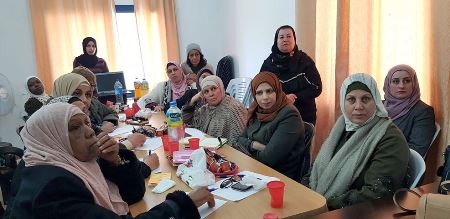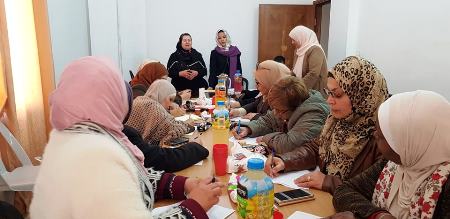|
MIFTAH caps off consultation meetings on the Palestinian draft constitution of 2016
Ramallah – As part of its “Policy, Dialogue and Good Governance” program and its ““Support Women Participation in Public Life” project, MIFTAH recently completed a series of consultation meetings on the Palestinian draft constitution, attended by a large sector of civil society institutions, representatives of political factions and university students from the various governorates. The participants reaffirmed that the constitution was one pillar of the state, which reflects citizenship rights and liberties. The meetings were aimed at promoting social dialogue and expanding the discussions in a way that include different components of society to enrich the discussion on the constitution, including the incorporation of societal perspectives of women and youth. The meetings During the meetings, constitutional fundamentals were addressed. The participants discussed the concept of a constitution and gave a snapshot of written and unwritten constitutions, pointing out that the constitutional system in any country reflects the values, culture and circumstances of that society at that point in time. They also said constitutions are affected by the historical context of the state, its cultural legacy , political party platforms, the strength of its social and women’s movements and the role of its civil society institutions. Furthermore, the participants addressed the means in which Palestinian constitutions have been affected by the reality imposed on them at each specific time, whether this refers to the 1952 constitution, the 1992 constitution or the Palestinian Basic Law of 2002. They discussed the mechanism for drafting constitutions around the world and especially in Palestine through discussing the constitutional draft committee in terms of its formation, components, philosophy and obstacles. They also discussed the opinions for and against ratifying a draft constitution or for preserving the Basic Law at least for the next stage. Recommendations The discussions and presentations from MIFTAH’s meetings held in the different governorates resulted in a number of recommendations including: Not to exclude women and youth The constitution must be all-inclusive, for women, men and youths, throughout its preparation and drafting, without excluding women and youth from the negotiating table during the constitution’s preparation. It must also give consideration to international agreements and the extent of their compatibility with the constitution; the importance of training and the recommendations of international and awareness committees for all sectors including women and youth and national factions, first and foremost the constitutional drafting committee. Drafting a popular referendum law The recommendations included a call for a popular referendum law that would guarantee the people’s voice in ratifying the constitution, which usually comes before the constitution is prepared and/or with the election of a constitution drafting committee to guarantee its neutrality and the representation of all sectors including women; they also called for the use of fair language for both men and women (gender-based drafting techniques), with a focus on the importance of social and political monitoring, the role of the constitutional court and the need for women’s representation in this court and in the documents of the constitution. Public and intensive awareness The recommendations also focused on Public and intensive awareness and the importance of having women and youth in the constitution along with gender-based mechanisms for its drafting. It moreover focused on the importance of recruiting specialists in international agreements pertaining to women’s rights and relevant international experiences. Benefiting from the experiences of other countries One recommendation was to benefit from the experiences of other countries that took gender and youth into consideration in its constitutions such as the Tunisian and Moroccan experiences; to coordinate with the Euromed Feminist Initiative (EFI) for training and benefiting from the guidebook on drafting constitutions from a gender perspective; the importance of women’s groups in raising awareness among its political leadership and the importance of the role of women in preparing and drafting the constitution and monitoring its implementation. This also applies to youth; there should be youths qualified and knowledgeable in constitutional law and in women’s and rights experiences in drafting the constitution and in the constitutional court on an alternate basis. Presidential and legislative elections The recommendations also reaffirmed the imperativeness of holding presidential and legislative elections along with the need for legal texts on the jurisdictions and authorities of the President, the PLC and the PLO. The role of civil society institutions and the media Reaffirming the role of civil society institutions in monitoring the constitutionality of laws and the performance and rulings of the constitutional court. There should be media programs that highlight the issue of the constitution and the integration of women, youth and all societal sectors in the relevant processes; the need to increase such meetings in universities, in the various governorates and among national and religious factions; to disseminate the recommendations and decisions of international committees pertaining to the rights of women, children and people with disabilities among others and include them in the constitution. MIFTAH project manager Najwa Sandouka-Yaghi maintained that these meetings and discussions mainly focused on the awareness material prepared by constitutional law professor, Dr. Sana’ Alsarghali. In parallel, MIFTAH is continuing its work on constitutional awareness as part of its media campaign, which will be launched in the next phase. It is also pressing for the inclusion of women’s perspective in the Palestinian constitution, which is in process with the supervision and consultation of a committee specialized in this field.


http://www.miftah.org |